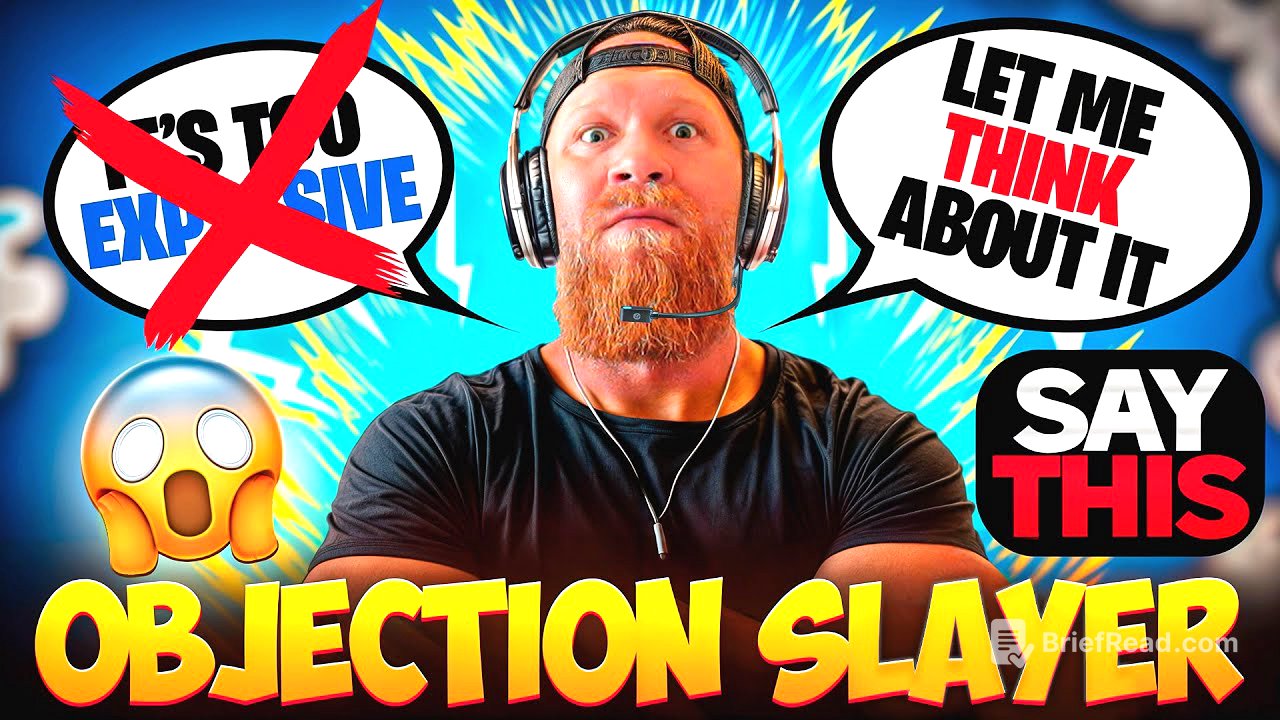TLDR;
This video provides specific strategies and word tracks for overcoming common high-ticket sales objections related to money, delays ("think about it"), and needing to consult a spouse. It emphasizes the importance of a good sales process, a strong offer, and understanding whether the objection stems from logistical issues or fear. The core method involves staying in agreement with the prospect, identifying the root cause of the objection, placing the prospect in an identity that aligns with making a positive decision, and guiding them to conclude that moving forward is in their best interest.
- Core objections: money, delay, spouse
- Differentiate between logistical and fear-based objections
- Place prospect in an identity aligned with positive decision-making
Introduction [0:00]
The video addresses common objections in high-ticket sales, such as "I need to think about it," "It's too expensive," or "I need to talk to my spouse." Taylor Robbins shares word tracks and strategies used in over 6,000 closing calls. She emphasizes that these objections often mask underlying issues and provides methods to uncover the true concerns.
Caveats to Overcoming Objections [1:13]
Before diving into specific word tracks, Robbins presents two important caveats. First, a good sales process and genuine connection with the prospect are crucial for uncovering honest objections. Second, the offer itself must be compelling and results-oriented to minimize objections. If the offer lacks value or doesn't mitigate risk, objections are more likely to arise.
Handling "Think About It" Objection [3:17]
When a prospect says they need to think about it, it could be due to logistical reasons or fear. First, determine if there are logistical hurdles, such as needing to move money or pre-planned commitments. If it's logistical, simply accommodate their timeline. If it's fear-based, put the person into the identity of a decisive person who just needs clarity. Acknowledge their need for clarity but highlight that complete clarity is impossible when venturing into new territory. Then, guide them to recognize that the proposed solution puts them in a better position than their current situation, prompting them to decide to move forward.
Handling Money Objection [9:09]
Money objections are typically rooted in logistical constraints or fear of uncertainty. First, isolate the objection by confirming that the prospect believes the offer will deliver the desired results. Then, use a forking question to determine if their concern is about whether they should do it or how to make the money work. If it's logistical, explore payment plans, financing, or credit card options. If it's fear-based, put them in the identity of an investor who is willing to take calculated risks for returns. Reframe the offer as an investment in their desired outcome and guide them to conclude that investing is the right course of action.
Handling Spouse Objection [14:02]
The "I need to talk to my spouse" objection may be logistical or a smokescreen. First, ensure the prospect is genuinely interested in moving forward. Then, determine what information the spouse would need to feel the same way. Flip the script by asking if those reasons would be sufficient if the roles were reversed. Reinforce the idea that they have a trusting relationship and that the spouse would support their decision to improve their situation. Finally, secure an emotional commitment by offering to send the agreement and schedule onboarding, while still respecting their need to have the conversation with their spouse. This allows them to emotionally commit to the sale while still feeling like they are honoring their relationship.
Key Takeaways [18:19]
The video concludes by summarizing the core method for overcoming objections: stay in agreement, determine if the objection is logistical or fear-based, place the prospect in an identity that aligns with making a positive decision, and guide them to conclude that moving forward is in their best interest.









